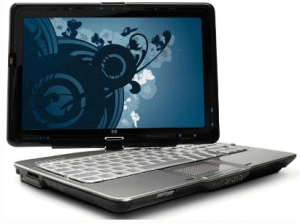In 2008 I bought a Hewlett Packard tablet PC. I used it five times before I gave up and went back to my desktop. It was too heavy to use as a slate, and almost too heavy to use as a laptop. Nowadays it’s just junk. I can’t even give it away.
Ever since I can remember, I was convinced tablet computers would replace desktop PCs and laptops. It seemed such a logical progression. They had touch screens, you could carry them around, what more could you ask? Yet even though tablet computers had been around since the late 1980s, by the time I put that HP into storage I was starting to wonder if they would ever take off.

Then of course, Apple brought out the iPad.
The iPad was the tipping point for tablet computers. Now, tablets are everywhere.
What about the technology that doesn’t last?
Recently, over at John Scalzi’s blog, Whatever, we posted about the ideas—or images—that were the precursor to writing Linesman.
One of these was
… we read about an early Comdex or Macworld exhibition where the first Apple Mac was on show. An old man stopped to look at the Mac. He picked up the mouse and moved it in front of the screen to see what would happen
One of the commenters (thank you, Matt), said
… what the old man was likely thinking of was the light pen, which was an even older technology that worked exactly like what he was trying to do with the mouse.
So naturally, I looked up light pens. Which are exactly what they sound like. A pen that you point at the screen and the screen detected the change in light and sent that information back to the computer. Think of it like a modern-day touch-screen, only instead of measuring electrostatic fields it measured light.
The light pen never took off because you had to hold it up to the screen for long periods of time. Look what we have now. Tablets, with touch screens.
To become popular a technology has to be useable. I didn’t use my HP tablet. It was too heavy both as a table and as a laptop. Light pens didn’t work because you couldn’t physically hold your hand up for long periods of time. (The requirement for specialised software would have impacted too, but software can be written.)
Timing and marketing also has an impact. Can anyone remember Betamax vs VHS? Which doesn’t matter any more, because both technologies are now obsolete.
The iPad is light. It looks good and it’s easy to use.
You don’t always get what you want
Back in 2008, when I bought my HP tablet, I expected that by 2015 the tablet would be the only thing I would use. I wouldn’t have another computer.
For some people it is, only for them it’s a mini-tablet and it’s called a mobile phone.
For me? I seem to have regressed. My phone is a phone and a camera, and that’s all. The only time I connect it to the internet is to download images.
My iPad? It’s the best little eReader around. I play the occasional game on it, and I use it to listen to music. That’s all. As for software—I’ve stopped trying to find new apps. I don’t use them.
My laptop. I can put it in my bag, which is a big plus. I use it on the train to write, and when I am out. Again, that’s it.
The bulk of my work is still done on the desktop PC.
Which is not what I would have expected mid-2015.
2 replies on “Reflecting on technology”
My experience mirrors yours, though the details are different. I’ve tried and discarded many software and hardware products over the years. And very often inconvenience of use is the reason why I discarded them. So I always make sure that I can return them without a major financial penalty if actual use at home reveals major problems. If a store charges a 15% or more “restocking fee” then I don’t buy the product – from them. (That’s for hardware; for software I get a free-to-try version.)
Too, I’m a software and systems engineer with many years of experience. I help create new systems, so I know the first version sold usually has many problems, of which poor usability is very often the biggest one. I buy the SECOND or later version of the latest and greatest knock-your-socks-off software or hardware product.
For a similar reason, I almost never get the VERY LATEST version of anything. Often the latest-but-one is perfectly adequate. I still use Word 2002 because it does everything I need and does it well.
One company which is a rare exception to industry-wide bad practices is Apple. They spend an enormous amount of thought and testing on the design of a new product before they commit implementation and manufacturing resources to it, and usability is their #1 concern. This extends to the documentation of their products, which is usually easy to understand by the novice user and sometimes downright graceful in a literary sense.
They do screw up occasionally, and they charge a premium for their products, typically 25% or more of the cost of comparable products.
So, so true. Foolish me, I clicked on upgrade to Windows 10 the other day. By accident, mind, but I thought I’d go ahead anyway. Foolish me. I still haven’t got my laptop back to truly usable yet.